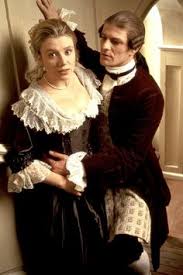Clarissa

(by Samuel Richardson) (1748)
The Varnished Culture mentions this merely to brag: longer than War and Peace (it’s the longest novel in English at approximately 984,870 words), this account of virtue chased and trashed is the novel’s version of continuous cricket: mad in detail, slow in execution, passionately related. Told in letters, very long letters, the correspondents spend what seems a year recalling a year but a crowded year. Take this book to a desert island; it will endure and also make a crackling blaze.
Coleridge nailed Richardson’s “close, hot, day-dreamy continuity” and Priestley (in Literature and Western Man) commented: “The whole fantastically elaborate business of Clarissa and Lovelace, over which so many eighteenth-century readers wept, could only exist in an over-heated evangelical -erotic dreamland.”
Walter Allen, in The English Novel, was a little more brusque: “…Richardson was mad – mad about sex, and I doubt whether it is possible for the critic who comes to Clarissa after reading Freud to deny that the novel must have been written by a man who was, even though unconsciously, a sadist in the technical sense; the loving, lingering, horrified, gloating descriptions of Clarissa’s long-drawn-out sexual humiliation at the hands of Lovelace, the rape that is constantly threatened and constantly deferred until, when it occurs, it has an additional horror simply because of its long postponement, provide an element of quite inescapable pornography…”
Are these reactions in fact overreactions, testimony to the length and depth of Clarissa? Mark Kinkead-Weekes, in his Samuel Richardson: Dramatic Novelist, considers that “Clarissa is the finest novel of its century“* and cautions against casting Miss Harlowe as an angel and Lovelace as a demon: “Clarissa’s tragedy is an exposure of a materialist and acquisitive society; of the moral decay of both the aristocracy and the ‘middle class’“** – a “struggle for Clarissa to come to terms with her fear of sex, her readiness to cast herself as a victim, her melancholy, and her morbid longing for death – or her spiritual pride, which is for Richardson at the heart of it all.”+ Lovelace’s “gaiety, his apparent candour, his wit and charm, even his rakehell insouciance and energy…[pose] a trap for the unwary and superficial here…For in [the] opening volumes we see him mostly through the eyes of Clarissa…“^
[*Page 1. **Page 124. +Page 488. ^Page 142.]
Leave a comment...
While your email address is required to post a comment, it will NOT be published.



1 Comment